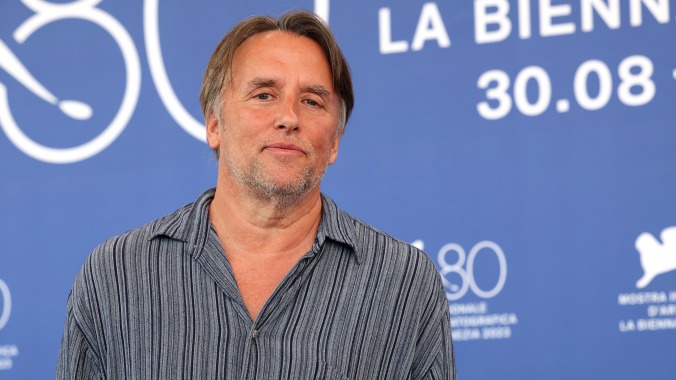Richard Linklater Photo: Victor Boyko (Getty Images)
Richard Linklater has experienced the movie business in all its many forms. Coming up in the Generation X indie boom with influential hangout movies like Slacker and Dazed And Confused, he quickly diversified his resume taking on extremely long-term projects and broad Hollywood comedies. Linklater’s balanced career allowed for expansive passion projects (Before trilogy and Boyhood) and experiments (Waking Life, A Scanner Darkly) while also dropping a School Of Rock every so often. He’s long had a good handle on the industry and how to make commercially viable entertainment that satisfies personal artistic goals. Yet, in a new interview with The Hollywood Reporter, Linklater paints an uncharacteristically pessimistic view of the industry.
Linklater, who is coming off a career-high Venice premiere of his latest film Hit Man, thinks the last “good era of filmmaking” is over, that “it’s gone with the wind—or gone with the algorithm.” It’s not uncommon for elder statesmen to bemoan modern circumstances. He wouldn’t be the first to say that the opportunities afforded to him at the beginning of his career no longer exist. Indeed, he says his contemporaries from the ‘90s will tell him, “Oh my God, we could never get that done today.” “Selfishly,” he believes that he feels lucky that he “was able to participate in what always feels like the last good era for filmmaking.” However, he does hope to be wrong.
Linklater admits that “distribution has fallen off” but mostly wonders, “Is there a new generation that really values cinema anymore?” The director runs a film society in Austin, giving him a chance to talk to “cinema-loving kids who have the Criterion Channel and they watch all kinds of amazing movies,” but he acknowledges that that is “the exception.”
Though he would know better than most, hasn’t that always been the case? Haven’t fans of art house cinema always been in the minority? There are cases where art and indie movies have broken through the noise, and there are examples of that today; Skinamarink, one of the most avantgarde and inscrutable horror films to ever play an AMC screen, managed to pull in $2 million in less than 1,000 theaters. While there is anecdotal evidence against what he’s saying, his sentiments are hard to ignore. Even with some successes, the industry appears to be in freefall.
“I fear that there’s not enough of a critical mass in the culture to sustain what was,” he said. “But who knows? I don’t think I have any deeper analysis than anyone else would, and it’s not in my nature to make huge statements about whether it’s all over. I just feel we’re all treading water and hoping we don’t drown. Challenging times are certainly here.”
“It’s really all of our modern cultural life”
He does have a more substantial point when talking about the role of tech in cinema and how Silicon Valley’s vulture capitalism has infected art with “content.” By collapsing everything into a single, disposable phrase that could be applied to anything, from literature to TikToks of wives protecting their porn-addict husbands from the nude scenes in Oppenheimer, tech-led and tech-chasing studios have cheapened all their products. “It’s hard to imagine indie cinema, in particular, having the cultural relevance that it did,” Linklater says. “It’s hard to imagine the whole culture is going to be on the same page about anything, much less filmmaking.”
That flattening, Linklater believes, is a cultural problem extending far beyond the movie theater. He says:
“We can be self-absorbed and say it’s just about cinema, but it’s really all of our modern cultural life. You could say the same things about reading books. A lot of young people can’t really read a book because they’re just on their phones. Some really intelligent, passionate, good citizens just don’t have the same need for literature and movies anymore. It doesn’t occupy the same space in the brain. I think that’s just how we’ve given over our lives, largely, to this thing that depletes the need for curating and filling ourselves up with meaning from art and fictional worlds. That need has been filled up with — let’s face it — advanced delivery systems for advertising. It’s sad, but what can you do?”
Ever the optimist, Linklater does offer some words of encouragement for us unfortunate peons saddled with a dying culture. “I also don’t want to go through life thinking our best days are behind us,” he said. “That’s just not productive. So, in your own area, you just have to persist and do what you can on behalf of the things that you believe in. You have to believe that everything can change and that things can go back to being a little better. Isn’t that what we all want for everything these days, from democracy on down? Can’t we just go back to being a little better?”
Of course, for his part, Linklater continues to persist. As always, he has several projects in the hopper, including the wide release of his now-buzzy Hit Man and a Boyhood-esque adaptation of Merrily We Roll Along, which he’s shooting over a 20-year production. Honestly, as long as Linklater can still do stuff like that, there’s reason to have hope for the future.
































![Rob Reiner's son booked for murder amid homicide investigation [Updated]](https://img.pastemagazine.com/wp-content/avuploads/2025/12/15131025/MixCollage-15-Dec-2025-01-10-PM-9121.jpg)








